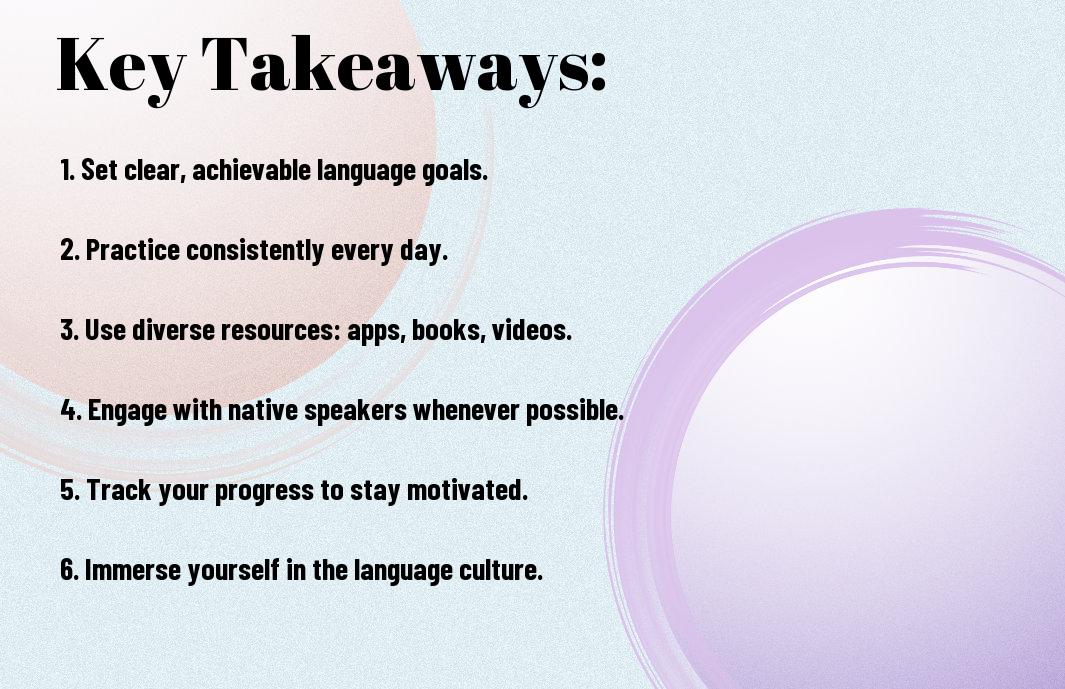You want to learn a new language, and you’re determined to do it on your own. Your motivation is strong, and you’re ready to put in the work. You’ll need a solid plan and the right tools to stay focused. Your journey will require discipline and practice, but with the right approach, you can achieve your goal and become proficient in your target language. You’ll start by setting realistic goals and creating a schedule that suits your lifestyle.
Key Takeaways:
To learn a language by yourself successfully, consider the following points:
- Set Realistic Goals and define what you want to achieve, whether it’s basic conversation skills or advanced fluency, to help guide your learning process.
- Establish a Study Routine that fits your schedule and lifestyle, ensuring consistent practice and progress in your language learning journey.
- Utilize Language Learning Resources such as online courses, apps, and language exchange websites to access a variety of study materials and interactive tools.
- Practice Active Listening and Speaking by engaging with native speakers, watching TV shows or movies, and listening to music in the target language to improve pronunciation and comprehension.
- Immerse yourself in the Language Environment by reading books, articles, and news in the target language to expand your vocabulary and get familiar with different contexts and expressions.

Setting Goals
A clear plan is crucial to learn a language by yourself. You need to define what you want to achieve and how you will get there. Your goals will guide your learning process and help you stay motivated.
Defining Your Motivation
Against the backdrop of your daily life, you must identify why you want to learn a language. Your motivation will be the driving force behind your learning. You will be more likely to stick to your plan if you have a strong reason for learning.
Creating a Learning Schedule
At the outset, you should create a schedule that suits your lifestyle. You will need to allocate time for learning and stick to it. Your schedule should be realistic and achievable.
This schedule will be the backbone of your learning process. You will use it to plan your daily lessons, set deadlines, and track your progress. By following your schedule, you will make steady progress and stay on track to achieving your language learning goals. You will be able to manage your time effectively and make the most of your learning experience.

Language Fundamentals
Now that you’ve decided to learn a language by yourself, it’s time to focus on the basics. You’ll need to understand the building blocks of the language to progress effectively.
Learning the Alphabet and Pronunciation
Above all, you must start with the alphabet and pronunciation. You can find numerous resources online to help you learn the correct pronunciation of each letter and sound.
Basic Grammar and Vocabulary
Along with learning the alphabet, you’ll need to understand basic grammar and vocabulary. You can begin by learning common phrases, verb conjugations, and basic sentence structures.
It is crucial to practice regularly, using your newfound knowledge to construct simple sentences and engage in basic conversations. You can use flashcards, language learning apps, or watch videos to help you learn and practice your grammar and vocabulary skills, and as you progress, you’ll become more confident in your ability to communicate in your new language.
Language Acquisition Methods
For effective language learning, you’ll need to explore various methods. You can try different approaches to find what suits you best, and combine them for optimal results. Your goal is to find a method that keeps you motivated and engaged in the learning process.
Immersion Techniques
Along with traditional learning methods, immersion techniques can be highly effective. You can surround yourself with the language you’re trying to learn by watching TV shows and movies, listening to music, and speaking with native speakers. This will help you get used to the sound and rhythm of the language.
Language Learning Apps and Software
Across the wide range of language learning tools, you’ll find many apps and software that can aid your learning. You can use them to practice grammar, vocabulary, and pronunciation, and to track your progress. They often offer interactive exercises and quizzes to make learning more enjoyable.
Language learning apps and software provide you with flexibility and convenience, allowing you to learn at your own pace, whenever and wherever you want. You can access a vast amount of learning materials, from beginner to advanced levels, and tailor your learning to your needs and interests. This will help you stay focused and motivated on your path to language proficiency.
Practicing Language Skills
Keep in mind that practicing language skills is necessary to your progress. You can find valuable tips on how to teach yourself a language at How To Teach Yourself a Language: 10 Key Strategies For Success, which will guide you through the process.
Speaking and Listening Exercises
Around this time, you’ll want to focus on speaking and listening exercises to improve your pronunciation and comprehension. You can start by listening to podcasts or audiobooks in your target language and speaking with native speakers or language exchange partners.
Reading and Writing Activities
About now, you should be developing your reading and writing skills. You can start by reading simple texts, such as news articles or blogs, and writing short essays or journal entries in your target language.
Also, as you progress, you can move on to more complex texts, such as literature or academic papers, and write longer, more structured pieces, like short stories or even a diary. This will help you to develop your vocabulary, grammar, and style, and to express yourself more effectively in your target language.
Overcoming Challenges
Many language learners face obstacles on their journey to fluency. You will encounter setbacks, and your progress may slow down. But with persistence and the right mindset, you can overcome these hurdles and continue to improve your language skills.
Managing Motivation and Discipline
The key to successful language learning is establishing a routine and sticking to it. You need to set achievable goals and track your progress to stay motivated and disciplined in your learning journey.
Dealing with Language Learning Plateaus
Like learning any new skill, language acquisition has its ups and downs. Linguistic growth can be slow and frustrating at times, making you feel like you’re not improving.
Hence, when you hit a plateau, you should reassess your learning strategy and make necessary adjustments. You can try new study materials, practice with a language exchange partner, or focus on a specific area of difficulty. By doing so, you can break through the plateau and continue to make progress in your language learning journey.
Staying Motivated
All language learners face a challenge in staying motivated. You will encounter setbacks, but perseverance is key. Your goal is to make progress, no matter how small, every day.
Finding Language Learning Communities
With like-minded individuals, you can share your experiences and learn from theirs. You’ll find online forums, social media groups, and local meetups where you can practice your language skills and get support.
Tracking Progress and Celebrating Successes
Any progress you make is a step in the right direction. You can use a journal or a mobile app to track your progress and celebrate your achievements, no matter how small they seem.
In fact, tracking your progress helps you see how far you’ve come and motivates you to continue learning. You’ll be able to identify areas where you need improvement and focus on those, making your learning more efficient and effective. By celebrating your successes, you’ll stay positive and encouraged to keep moving forward with your language learning journey.
Final Words
With this in mind, you’ve got the tools to learn a language by yourself. You can find valuable advice on How do I teach myself a new language? : r/languagelearning. Stay focused, stick to your plan, and your progress will be steady. You will see improvement in your language skills, and that’s what keeps you moving forward. Your hard work and dedication will pay off, and you’ll become proficient in your target language.
FAQ
Q: What are the most effective methods for learning a language by myself?
A: To learn a language by yourself successfully, you should combine various learning methods. Start by setting achievable goals and creating a schedule to stay motivated and organized. Utilize online resources such as language learning apps, podcasts, and YouTube channels that offer a structured approach to language acquisition. Additionally, engage in active learning by practicing speaking and writing through tasks like journaling, speaking with native speakers, and participating in language exchange programs. Immersing yourself in the language by watching TV shows and movies, listening to music, and reading books in the target language can also significantly enhance your learning experience.
Q: How can I overcome the challenges of learning grammar and vocabulary on my own?
A: Overcoming the challenges of learning grammar and vocabulary requires consistent practice and the use of diverse learning tools. For grammar, focus on understanding the rules and then practice applying them through exercises found in textbooks or online. For vocabulary, use flashcards, either physical or through apps like Anki, to memorize new words. Learning vocabulary in context, such as through reading or listening to stories, can also help solidify new words in your memory. Furthermore, using spaced repetition, a technique where you review material at increasingly longer intervals, can be highly effective in retaining grammar rules and vocabulary over time.
Q: What role does consistency and self-motivation play in successfully learning a language by myself?
A: Consistency and self-motivation are key factors in learning a language by yourself. Establishing a daily routine, even if it’s just 15-20 minutes of practice, is more effective than practicing for long hours once a week. Self-motivation can be maintained by celebrating small achievements, finding a language learning community for support, and rewarding yourself upon reaching milestones. It’s also important to understand that learning a language is a marathon, not a sprint, and it’s normal to encounter plateaus. Staying positive and reminding yourself of your reasons for learning the language can help you stay motivated and committed to your goal.

